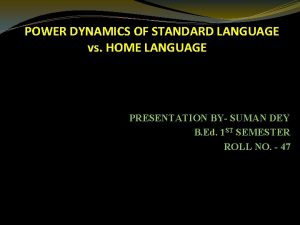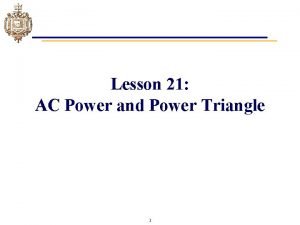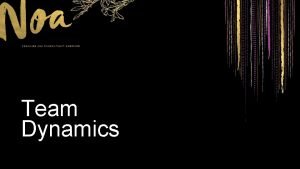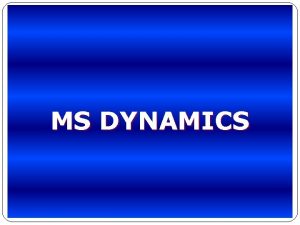POWER DYNAMICS OF STANDARD LANGUAGE Vs HOME LANGUAGE









- Slides: 9

POWER DYNAMICS OF STANDARD LANGUAGE Vs. HOME LANGUAGE PRESENTATION BY- SANGITA BARMAN STANDARD- B. Ed. 1 st semester ROLL NO. : 37

UNDERSTANDING OF THE TERM POWER DYNAMICS • Power dynamics stands for the role and influence of any subject.

UNDERSTANDING STANDARD LANGUAGE AND HOME LANGUAGE STANDARD LANGUAGE HOME LANGUAGE • Standard language is a special dialect of some language which has been codified, modified and elaborated for various formal use • Home language is a language which an individual learns in which he/she has been born and brought up.

DEFINITION OF HOME LANGUAGE IN CONTEXT TO 21 ST CENTURY In 21 st century, standard language refers to the language which is spoken in the capital areas of the country and is also participated by the majority of the educated (formal education) section of the society.

ROLE OF STANDARD LANGAUGE GENERAL ROLE • Standard language proves to be unique and universal language which is used for different formal task. ROLE W. R. T TO INDIAN CONTEXT • India being a multilingual country standard language proves to be a unique and universal tool for any literary or non- literary work.

HOME LANGAUAGE • Home language is often called as the family language or sometimes synonymously used with “MOTHER TOUNGUE”. TOUNGUE

ROLE OF HOME LANGUAGE • An individual gets entry into the social life or society first by use of this language. • Forms the backbone of ethnic identity of a religion. • Enables one to spontaneously participate in the socio cultural field.

DIFFERENCE BETWEEN HOME LANGUAGE AND STANDARD LANGUAGE HOME LANGUAGE spoken by the educated people living in capital of a country. Learned by the child where he /she is born and brought up. Homogeneous Heterogeneous Main stream language and does not involve grammatical experimentation Has variety and has grammatical experimentation Acquired through some organized language learning programme. Learnt in the family. Extensively used in the production of literary and non literary text. Generally not used in the production of literary and non literary text. Has wide acceptance. Limited acceptance generally used in front of known one. Cannot act as gate pass for any individual Gets entry into society by home language. being into society. Ethnicity has nothing to with standard language Ethnicity survives through home language.

THANK YOU
















